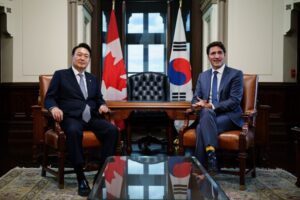Justin Trudeau in South Korea between environment and business
TORONTO – Justin Trudeau’s first official visit to South Korea: the prime minister left Canada today for a week-long trip to Asia, where he will participate in the G7 leaders’ summit in Japan but, first, he will stop in Seoul, where he will reciprocate South Korean President Yoon Suk Yeol’s visit to Ottawa last fall. Since then, both countries have agreed on their Indo-Pacific strategies, plans that aim “to counterbalance Chinese influence by increasing economic and military ties in the region”.
Once in Seoul, Trudeau will participate in the opening ceremony of the Kapyong Battle Commemorative Trail, “to honor Canada’s contributions to the Korean War”, but the Canadian prime minister is not expected to visit the demilitarized zone that separates North and South Korea.
Trudeau will then participate, as we said, in the summit of G7 leaders in Japan, between May 19 and 21, in Hiroshima, a symbolic place chosen by the Japanese government to symbolize its “commitment to peace in a period in which there is more and more talk frequent use of weapons of mass destruction”. Those same weapons that the United States first used in Japan, where they dropped the first atomic bombs in the history of humanity on Hiroshima on August 6, 1945, destroying the city and killing 140,000 people and on Nagasaki a few days later, killing others 70,000 people.
The leaders of the G7 countries – Canada, the United States, the United Kingdom, Germany, France, Italy and Japan – meet every year to work together on shared goals. This year’s summit will focus on seven main topics, including global security and geopolitical issues, economic resilience, climate change and energy. “I think it will be one of the most successful summits since they started in 1975” said John Kirton, professor of Political Sciences who heads the G7 research team at the University of Toronto. “Never before has a G7 summit had to address so many major interconnected global crises all at once”.
One of Canada’s top priorities will be to strengthen ties among allied countries to address these converging challenges. Canada will in particular seek cooperation from G7 members to provide continued support to Ukraine and to address climate change. The liberal government led by Justin Trudeau is investing heavily in the transition to a green economy, arguing that promoting cleaner energy sources and technology will bring economic prosperity to the country, while limiting the risk of catastrophic climate change and also ensuring greater security.
“The clean economy presents a once-in-a-lifetime opportunity not only to keep 1.5 degrees Celsius of warming within reach and avoid the worst impacts of climate change, but also to create and secure good middle-class jobs for the our people and grow our economies” Trudeau said. “When we reduce emissions we can drive economic growth and build new strong and reliable supply chains that reduce our dependence on raw materials and components even from countries like China and Russia. This is economic policy, it’s climate policy and it’s security policy”.
Transitioning to a clean economy should also be a focus of Trudeau’s visit to South Korea. In an interview with The Canadian Press, South Korea’s ambassador to Canada, Lim Woongsoon, said his country “is interested in increasing trade ties in areas such as clean fuel and critical minerals. Canada can be an ideal partner for Korean companies to manufacture electric vehicle batteries and battery components”. Environment and business hand in hand.
In the pic above, the meeting between Justin Trudeau and Yoon Suk Yeol last autumn in Canada (photo from Twitter – @CanadianPM)



